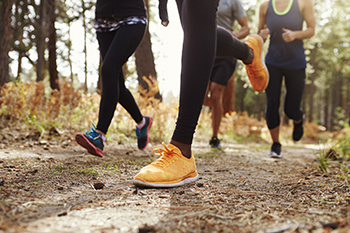Tips on Shoes for Trail Runners
Tuesday, 07 February 2023 00:00
If you participate in trail running, deciding when to replace your shoes can be a guessing game. Running experts agree that keeping track of the life of your shoes is an important way to prevent injury. In addition, it is also recommended that runners have a number of pairs of shoes to wear, depending on the type of terrain, stride habits, and training goals. While replacing running shoes can become expensive, the cost of not doing so is the health of your feet and ankles. Most trail shoes last between 300 and 500 miles. Wear and tear of the shoe involves paying attention to the upper, the midsole, and the outsole. The most important of these is the midsole cushioning, which can be hardest to monitor. You can tell when the cushion is wearing out by how much it springs back to shape after a run. A flattened midsole is a major contributor to overuse injuries. Experts suggest having at least two pairs of trail shoes that can be alternated. For more information on how to protect your feet from injury as a trail runner, please consult with a podiatrist.
All runners should take extra precaution when trying to avoid injury. If you have any concerns about your feet, contact the podiatrists of New England Family Foot Care. Our doctors will treat your foot and ankle needs.
How to Prevent Running Injuries
There are a lot of mistakes a runner can make prior to a workout that can induce injury. A lot of athletes tend to overstretch before running, instead of saving those workouts for a post-run routine. Deep lunges and hand-to-toe hamstring pulls should be performed after a workout instead of during a warmup. Another common mistake is jumping into an intense routine before your body is physically prepared for it. You should try to ease your way into long-distance running instead of forcing yourself to rush into it.
More Tips for Preventing Injury
- Incorporate Strength Training into Workouts - This will help improve the body’s overall athleticism
- Improve and Maintain Your Flexibility – Stretching everyday will help improve overall performance
- “Warm Up” Before Running and “Cool Down” Afterward – A warm up of 5-10 minutes helps get rid of lactic acid in the muscles and prevents delayed muscle soreness
- Cross-Training is Crucial
- Wear Proper Running Shoes
- Have a Formal Gait Analysis – Poor biomechanics can easily cause injury
If you have any questions, please feel free to contact our office located in Milton, MA . We offer the newest diagnostic and treatment technologies for all your foot care needs.




